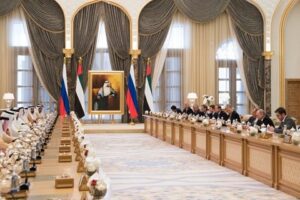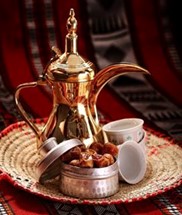 As the World Protocol Magazine Editorial Board, we take enormous pride in keeping this platform open to all experts from the numerous fields of business and protocol: Israa Shaheen, from the UAE is the next of many who have taken the opportunity of working together with WPM.
As the World Protocol Magazine Editorial Board, we take enormous pride in keeping this platform open to all experts from the numerous fields of business and protocol: Israa Shaheen, from the UAE is the next of many who have taken the opportunity of working together with WPM.
Ms Shaheen is an Etiquette and Protocol expert, consultant, and trainer, trained and certified by the European School of Protocol – London. She was born and raised in the United Arab Emirates, and between living her whole life in the UAE and working with multinational organizations, she gained the needed knowledge and experience to create a bridge between the eastern and the western cultures. Ms Shaheen’s passion lies in empowering people to become more confident, courteous, and professional in business and social situations, through equipping them with the essential etiquette and protocol knowledge for them to succeed personally and professionally. In addition to training and consulting, she is featured in multiple TV interviews and shares etiquette and protocol tips and tricks through her LinkedIn and Instagram posts and articles.
Protocol and etiquette are two different concepts, yet they have some similarities. Both concepts exist to govern our behavior and ensure that mutual respect exists in relationships, whether those relationships were social, professional, or political.
And while the rules and standards of acceptable and appropriate behavior are most of the time written and agreed on, they can and would change with the change of culture. Hence, they are highly needed to eliminate unacceptable and embarrassing behavior happening due to cultural ignorance.
In this article I will shed light on the effect of the Emirati culture on protocol and etiquette.
 Let’s start by meeting and greeting. A handshake is the most common form of greeting in the UAE; however, in most situations, physical contact is avoided with the opposite gender. Generally, a gentleman should always wait for a lady to initiate the handshake, but if she placed her right hand over her heart, it indicates that she is avoiding physical contact.
Let’s start by meeting and greeting. A handshake is the most common form of greeting in the UAE; however, in most situations, physical contact is avoided with the opposite gender. Generally, a gentleman should always wait for a lady to initiate the handshake, but if she placed her right hand over her heart, it indicates that she is avoiding physical contact.
After greeting a guest, we will notice that the host would always reserve the position of honor to his/her right for the guest, whether in a seating arrangement or while walking. However, during official ceremonies, the guest and the host switch places when inspecting the guard of honor.
 When applying the same rule on flags, the position of honor is on the left-hand side from the viewer’s point of view. And while in most countries the position of honor is given to the national flag, in the UAE, it is given to the visiting country as shown in the photo. Here, the host country’s own flag (UAE) was placed to the left of the visiting country’s flag (Russia).
When applying the same rule on flags, the position of honor is on the left-hand side from the viewer’s point of view. And while in most countries the position of honor is given to the national flag, in the UAE, it is given to the visiting country as shown in the photo. Here, the host country’s own flag (UAE) was placed to the left of the visiting country’s flag (Russia).
 Another detail related to meeting and greeting is the Arabic Coffee (gahwa), which is usually served with dates. Serving Arabic coffee is an important element of hospitality in Arab societies. And as a gracious guest, you should always accept Arabic Coffee when served, at least the first round. Moreover, it is important that you receive the coffee cup with your right hand. Once you’re done, and when returning your coffee cup to the person who served it, you should shake it a little bit if you don’t want a refill.
Another detail related to meeting and greeting is the Arabic Coffee (gahwa), which is usually served with dates. Serving Arabic coffee is an important element of hospitality in Arab societies. And as a gracious guest, you should always accept Arabic Coffee when served, at least the first round. Moreover, it is important that you receive the coffee cup with your right hand. Once you’re done, and when returning your coffee cup to the person who served it, you should shake it a little bit if you don’t want a refill.
One more aspect of interaction between hosts and guests that is affected by culture is gift giving, in both social and business contexts. There are certain items you should avoid giving as gifts due to religious reasons, such as alcohol or alcohol-related products and food that contains pork in its ingredients.
 When it comes to body language, one of the biggest faux pas in the Emirati culture is to show the sole of your foot or shoe when seated. Hence, you are advised to keep your feet planted on the ground while sitting down, don’t cross your legs during meetings to avoid disrespecting others by pointing your foot towards them and showing the bottom of your shoes.
When it comes to body language, one of the biggest faux pas in the Emirati culture is to show the sole of your foot or shoe when seated. Hence, you are advised to keep your feet planted on the ground while sitting down, don’t cross your legs during meetings to avoid disrespecting others by pointing your foot towards them and showing the bottom of your shoes.
 A final point I would like to highlight in this article is the dress code. Professionally, the business attire is formal. Gentlemen can opt for a suit and a tie for business meetings. On the other hand, as for ladies, they are always expected to dress modestly. Avoid see-through material, low necklines, sleeveless tops and short skirts. Ideally, skirts should cover the knees.
A final point I would like to highlight in this article is the dress code. Professionally, the business attire is formal. Gentlemen can opt for a suit and a tie for business meetings. On the other hand, as for ladies, they are always expected to dress modestly. Avoid see-through material, low necklines, sleeveless tops and short skirts. Ideally, skirts should cover the knees.
When looking at the UAE’s population, you will notice that the expatriate community outnumbers the population of UAE nationals, where Emiratis represent 11.5% of the population, while expatriate residents represent 88.5%. And even though the UAE is an international model of cultural diversity, as it is the home of more than 200 nationalities living and working in harmony, one should not ignore the Emirati identity and culture.
I am writing this article in conjunction with Expo 2020 Dubai, which takes place from the 1st of October 2021 till the 31st of Match 2022. During this marvelous exposition, the UAE is hosting the world. And while it’s the host’s role to be hospitable, it’s the guest’s role to respect the host’s culture.
Source of pictures:
1: The Author’s own
4: https://www.pinterest.com/pin/427349452148444385/
5: https://www.123rf.com/stock-photo/emirati.html?sti=nqrf36iz8x19bhqb33|
6: https://gulfbusiness.com/all-you-need-to-know-about-the-opening-ceremony-of-expo-2020-dubai/
1https://www.globalmediainsight.com/blog/uae-population-statistics/




